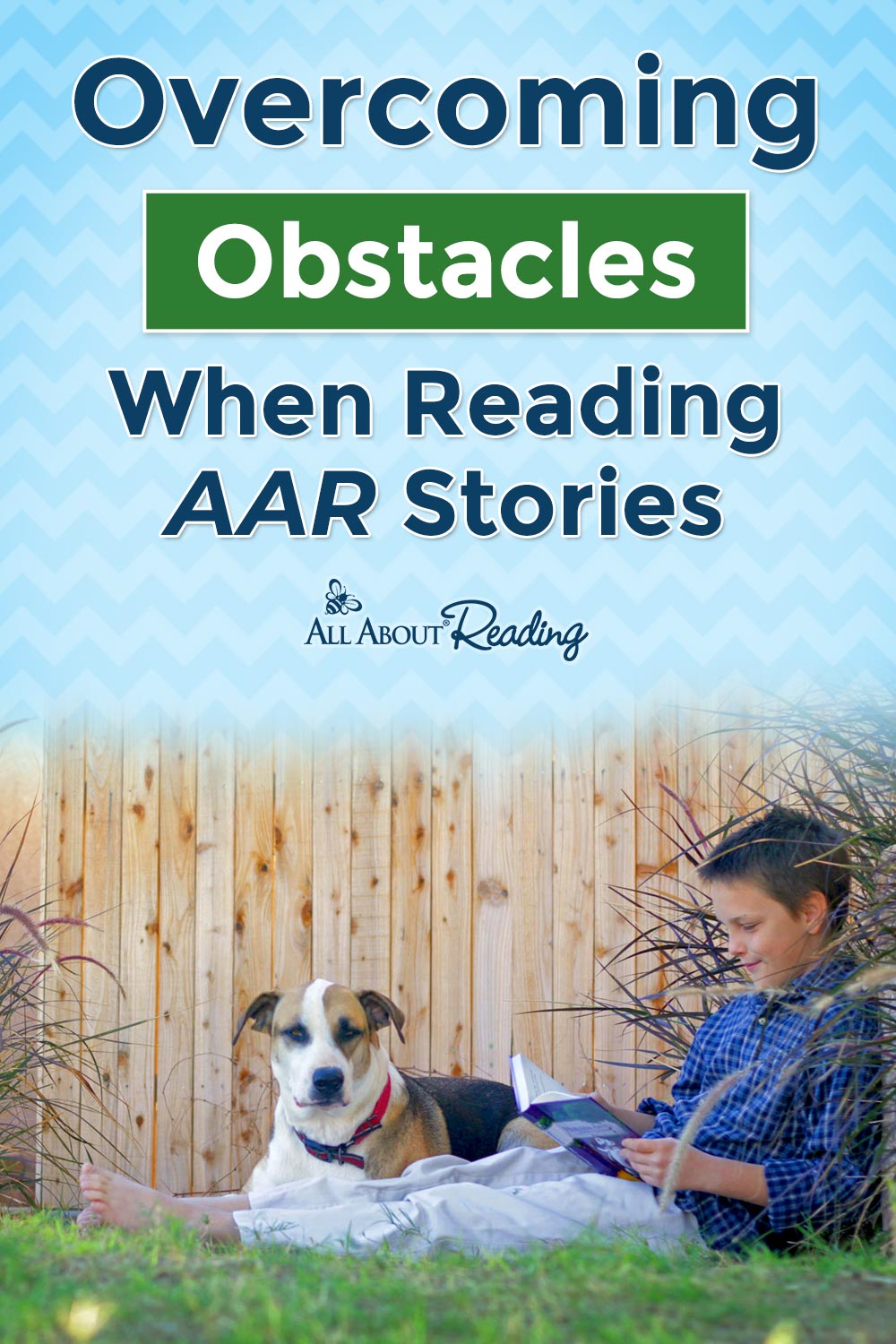Overcoming Obstacles When Reading AAR Stories

One of the most important things you can do when teaching your child to read is to provide lots of reading practice. That’s why the All About Reading program includes such a wide variety of activities, games, and decodable stories. But sometimes things don’t go perfectly according to plan!
Learning to read can be hard work! Many kids see this as a fun challenge, but some kids just get discouraged.
So what do you do if your child hits a roadblock and suddenly doesn’t enjoy reading the short stories?
This post will give you lots of solid ideas to get your child back on track—and enjoying reading again. Let’s dig in!
Determine What Is Making the Stories Difficult for Your Child
The first step is to get to the root of the problem. Ask yourself these questions:
- Is your child working in the correct level? (Check out our placement tests or contact us for placement help.)
- Have you been moving through the lessons too quickly? (If so, back up a few lessons and slow the pace.)
- Is your child guessing at words instead of decoding? (If so, start with the tips in this article on Breaking the Word Guessing Habit.)
- Have you been following the lesson plans as written? (If not, strongly consider including each lesson component without skipping any. Each element is important.)
- Does your child have vision problems? (Check out the signs of vision problems in children.)
- Is your child actually making good progress, but the stories just seem harder or longer than he would like? Does he have a short attention span? Or maybe he has extremely high expectations for himself. If so, the tips in the next section will be invaluable!

6 Ways to Help Your Child Read Short Stories
After you’ve ruled out underlying reading issues, you can tackle the problem head-on. Whether you’re using All About Reading or not, here are some suggestions:

Set a timer. Have your student read until the timer goes off. Choose the length of time according to your student’s ability and attention span. You may need to start with a short time such as three minutes, and then gradually build up to ten minutes.

Divide the story into two or three parts. Have your student read just one section in a sitting. Bookmark the page. At the next reading session, have your student listen as you reread the part he has already read, and then have him continue reading on his own.

Reread. Rereading stories from previous lessons will help your student gain fluency and confidence. During subsequent readings, your child will be “warmed up,” allowing him to experience better comprehension and helping him to enjoy the stories more.

Try buddy reading. Split up the reading duties by reading with your student. Alternate pages by reading a page yourself and then having your student read the next. For more practice, try buddy reading twice, switching pages each time, and then have your child read the story on his own.

Review. The more familiar a child is with the words in a story, the easier it will be for him to read the story. So be sure to spend plenty of extra time reviewing words with flashcards, activities, and Practice Sheets before reading the story.

Encourage your child. Reading stories takes a lot of mental effort—especially for kids who haven’t yet developed automaticity (the ability to read the words without conscious thought). The other tips in this section will help as your child develops automaticity, but be extra supportive in the meantime.
Do you have a child who is struggling with the stories? Sometimes it only takes a little extra push to build a child’s motivation to read, but if your child continues to struggle, please know that we are here to help.













Bolaji Monsurat
says:Good day my daughter is 8years , she battling with identifications of some letters how can I help her become a story reader
Robin
says: Customer ServiceBolaji,
I’m so sorry to hear that your daughter is having struggles.
However, learning to read is a step-by-step progression. Until your daughter has mastered all the letters, she will not be ready to ready stories. Here are some articles I think you will find helpful:
The “No Gaps” Approach to Reading and Spelling
Top 10 Activities for Letter Knowledge
How to Teach Phonograms
Helping Kids Sound Out Words
Melanie
says:I went backwards in lessons recently – it has made a difference. She realizes that she has read this before, but doesn’t seem to mind.
Robin E.
says: Customer ServiceThank you for sharing this, Melanie. I’m pleased to hear that backing up has made a difference too.
Dawn
says:My daughter is in AAR 3 lesson 11. She knows all her word cards so far. But when it comes to actually reading the book she complains so much. She doesn’t like to point or use things to cover up part of the story. She says she can’t do it or it’s too much. She wants and expects that she should be reading like mom. I know we all have our off days. But I just can’t figure it out with her. Some days when she finally reads the story she does really well. Other days she gets aggravated and says I can’t do it and she’s sounding out so many words. These are words she knows from the cards & sometimes she doesn’t seem to
Remember how to sound them out (she knows the rules & how to). It’s so frustrating for me. Sometimes I think her brain is just working so fast – she just can’t get it out…. if that makes any sense. She just wants to do it and be done. Everything comes so easily and naturally to her but not reading, even though when she doesn’t give me grief about reading she reads so well. I just don’t get it. How do I get her to love reading and want to do it all the time? What am I missing? Any thoughts would be greatly appreciated. Thanks!
Robin E.
says: Customer ServiceI’m sorry to hear your daughter is struggling, Dawn!
First, you are probably already doing this but I like to make sure, limit your reading time to just 20 minutes a day but do it consistently 5 days a week. Spending too much time on any one day can lead to fatigue and tiredness, and that isn’t helpful for building a good attitude toward reading. However, not doing reading consistently enough often results in students having trouble easily recalling what was covered previously, so that the work is more difficult than it needs to be.
Second, as long as reading remains hard work, it will be hard work and people naturally tend to not enjoy things that are hard. Your goal at this point is to focus on getting her to the point that reading is easy, and then enjoyment and motivation for reading will be easier to build.
Do you have the Queen Bee Reader from All About Reading Level 2? Ask her to read the last or second to last story from that book. How does it go? Can she read it smoothly and fluently, needing to sound out no more than a few words per page and misreading or needing help with no more than a few words total? If you don’t have the Queen Bee Reader, you can use the “Rawhide” story from our sample of the Queen Bee.
I ask this because the issue may be that she isn’t quite ready for Level 3 yet. All About Reading includes research-based instruction in all aspects of reading, not decoding skills, but also in fluency, automaticity, comprehension, vocabulary, and lots and lots of reading practice. A child needs to be fluent with the Level 2 stories before being ready to progress into Level 3 or otherwise Level 3 is too difficult.
On the other hand, if she is fluent and comfortable with the last stories of Level 2, it may be that she needs to slow down and spend more time reviewing in Level 3. How many days are you typically spending on each Level 3 lesson?
Consider trying Buddy Reading the stories with your child to help her build smooth, fluent reading. This is very helpful for many children! You can also revisit stories from previous lessons. We have an Overcoming Obstacles When Reading AAR Stories article you may find helpful too.
The fluency pages can be re-used as well. You might enjoy our 16 Ways to Make Practice Sheets Fun. (And check out the comments as well–lots of fun suggestions in there.)
I hope this helps some, but please let me know if you have additional questions or would like more help. I’m happy to help as much as you need to help her be successful with reading!
Ijeoma
says:Very encouraging.
Robin E.
says: Customer ServiceI’m glad this was encouraging to you, Ijeoma!
Vijay S
says:Very informative…..this can help me lot
Robin E.
says: Customer ServiceIt’s wonderful that this has been helpful for you, Vijay!
ALICE
says:I agree with your advice so much on the phonics readers. There is a little boy 6 years old that comes to my Phonics center and he has never been to school. So he is preliterate. His mom brought him to me. He didn’t know the names of the letters nor the sounds of the 26 letters. I used phonics and the same principles that you teach as well some of my own. He replied to me, “The only reason I come here is to read those little books that have and the little stories.” I have printed out some of the cvc and cvcv phonics stories from your site along with little books that i have purchased. We all know that the real reason he comes to my center is because his mom makes him. lolol
Robin E.
says: Customer ServiceAlice,
Of course he comes because his mother brings him, but what a wonderful attitude for this child to have that the stories are worth his being there!
ALICE
says:Yes! You are so right. I love that little fella.
ALICE
says:great and colorful readers! i love level as it is truly decodeable for first time readers.
Robin E.
says: Customer ServiceThank you, Alice!
Jen
says:My kiddo resists re-reading. We’ve started buddy re-reads, and that’s helped but I’d be interested in any other ideas for helping my son warm up to try-reading.
Robin E.
says: Customer ServiceJen,
I’m sorry to hear your child resists rereading. It is such a great strategy for helping students develop smooth, fluent reading. I hope the buddy reading helps. Maybe you could try a reward system, such as for each reread of a story he can choose a favorite activity or something?
Lauren
says:We do a reward system which has been a big motivator. For every 15 minutes, my son gets a ticket in his jar. After 5 tickets he can cash it in for 15 minutes computer game, or save for 10 tickets for a better prize, etc.
Robin E.
says: Customer ServiceThank you for sharing your reward system, Lauren! It sounds like it would be a great motivator!
Leslie
says:Love the ability to switch between these different strategies to help my kiddo “do hard things”!
Stacie McGregor
says:So helpful! Thank you!
Robin E.
says: Customer ServiceYou’re welcome, Stacie! I’m glad this was helpful!
Jacqueline
says:The specific, systematic & explicit reading instruction of AAR can’t be beat. This program really is effective for every child learning to read.
Robin E.
says: Customer ServiceOh, thank you, Jacqueline! What a great review!
Katie
says:These tips are very helpful. My child reads single words and even sentences fine, but he gets frustrated or tiresome when the story length extends or there are several sentences on a page. We will be trying these out to make the program an even better fit for us than it already is.
Robin E.
says: Customer ServiceI hope this find these tips helpful for your child, Katie! However, if you need additional ideas or help, please let us know.
Rena
says:Buddy reading really helped my son when we started this program. We’re in AAR level 3 now and he usually reads the stories all by himself, but on the days he feels overwhelmed we will go back to buddy reading. He’s also not a big fan of the practice sheets, so we usually do some kind of activity with them so he can still get the practice. We really enjoy AAR!!!
Robin E.
says: Customer ServiceRena,
Thank you for sharing how buddy reading has helped your son with reading! And I love that you find activities to help make the fluency practice sheets more enjoyable!
Jennifer Anderson
says:My daughter loves reading these stories. We do benefit from shared reading, and taking 2 days per lesson
Robin E.
says: Customer ServiceI’m pleased to hear that your daughter is enjoying the stories and that you are using some of the tips here with them. Thank you for sharing, Jennifer!
Amanda
says:I’m going to try the re-reading strategy this week! I think my son will like it and help encourage him to see the progress he has made.
Robin E.
says: Customer ServiceI’d love to hear how rereading goes with your son, Amanda! It was an important activity for my youngest child and helped her to master fluent reading.
rebecca
says:re-reading is a really great idea. it gives kids a feeling of success because they have better understanding of what they are reading
Robin E.
says: Customer ServiceSo true, Rebecca!
Renatta
says:We love buddy reading at our house. It’s less daunting for my dyslexic kiddos, and we can make great forward progress without getting exhausted so quickly. Thanks for the other suggestions too!
Robin E.
says: Customer ServiceI’m glad to hear that buddy reading is working out well in your house, Renatta! I hope you find the other suggestions as helpful.
Nicole
says:The buddy reading strategy really helped my son when he was first getting started.
He doesn’t like the practice sheets, so using AAR’s tips for turning them into games or breaking them up has really helped. He likes doing the flashcards, especially because he doesn’t have to be sitting at the table to do them.
Robin E.
says: Customer ServiceI’m glad the tips for helping with the fluency practice sheets have been helpful, Nicole. I love that you find ways to work on flashcards without sitting at the table too!
Mandi
says:This program has made a huge difference in my son’s reading and spelling!
Robin E.
says: Customer ServiceWonderful, Mandi!
Julianne
says:We love all about reading Level 1 so far and look forward to continuing!
Robin E.
says: Customer ServiceGreat to hear, Julianne!
Nanette Schow
says:Thank you for sharing these helpful tips!
Robin E.
says: Customer ServiceYou’re welcome, Nanette!
Cara
says:This is awesome, thank you – exactly what I needed to see!
Robin E.
says: Customer ServiceYou’re welcome, Cara! I’m glad this was helpful.
Rosa DeVoe
says:We are just 2 weeks into to the All About Reading program and are already seeing a beautiful increase in my son’s reading confidence. I love how each lesson uses the same words in multiple different ways to make the next step less overwhelming.
Robin E.
says: Customer ServiceI’m so pleased to hear you are already seeing an increase in your son’s confidence in reading, Rosa! How exciting! Thank you for sharing.
V. Butler
says:This has been the only spelling program to work for my son!! So grateful that I found it and gave it a try!
Robin E.
says: Customer ServiceI’m so pleased to hear that All About Spelling is working well for your son!
MADELYN D Dwyer
says:Thank you for all the free resources and advice!
Robin E.
says: Customer ServiceYou are so welcome, Madelyn!
Bethany Jackson
says:Thanks for the tips! I can’t wait to try this with my boys!
Allison
says:My daughter’s reading fluency has improved so much with AAR! I love that the stories are decodable for her and don’t include any sounds that haven’t been taught. Thank you so much!
Robin E.
says: Customer ServiceThis is great to hear, Allison! I’m glad that All About Reading is helping your daughter to read with fluency.
Sheri Knowlton
says:AAR has been a game changer in our homeschool classroom. It has helped our little one feel confident in reading and develop a love for it. A lot of these tips are really great tips that we already use and a few new ones. Setting a timer has been huge for us.
Robin E.
says: Customer ServiceOh, I’m so pleased to hear that All About Reading has been so helpful for your homeschool, Sheri! We love confident readers!
Karri Miller
says:Terrific tips! Thank you!
Nicole McDermott
says:Love all of these ideas to make reading more enjoyable! We like the timer and buddy reading options here.